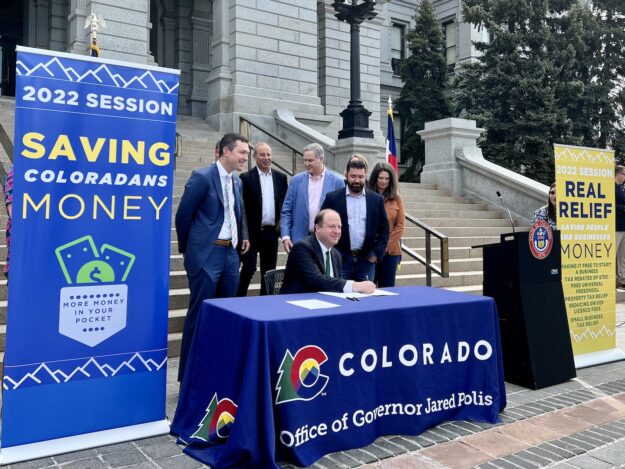Widgetized Section
Go to Admin » Appearance » Widgets » and move Gabfire Widget: Social into that MastheadOverlay zone
Colorado taxpayers likely to see much higher refunds than originally forecast, officials say

Individual Colorado taxpayers can expect early refund checks of $750 in late summer, while joint filers could see $1,500 checks, according to estimates from an economic forecast released Tuesday.
Those amounts are nearly double the $400 and $800 checks that state officials predicted Coloradans would receive when they first announced the new tax refund policy back in April.
That’s because Tuesday’s quarterly economic forecast by nonpartisan Legislative Council Staff anticipates a 21.8% year-over-year increase in state general fund revenue for fiscal year 2021-2022, which ends June 30. The state’s general fund mostly consists of revenue from income and sales taxes, and income tax payments “considerably surpassed expectations” in 2021 and early 2022.
A separate June forecast from the governor’s Office of State Planning and Budgeting does not estimate the amount of the refund checks, but a news release issued today states that the refunds will be “at least $500.”
The voter-approved constitutional amendment known as the Taxpayer’s Bill of Rights, or TABOR, requires the state to send surplus revenue back to taxpayers each year. TABOR calculates the annual revenue limit using a formula based on the prior year’s limit plus the rate of inflation and population growth.
While TABOR has been around for decades, the refund checks heading out in late summer are new. Normally, taxes the state collects above the revenue limit are refunded to taxpayers through one or more of the following mechanisms: property tax reimbursements for local governments, an income tax rate reduction and a sales tax refund. These mechanisms are determined, and can be changed, by the Legislature.
The sales tax refunds for a given year typically are paid out after people file their taxes the following year — so under normal circumstances, they’d get their refund checks for fiscal year 2021-2022 in spring 2023. But lawmakers this year passed Senate Bill 22-233 to send out part of the TABOR refund early, in summer 2022, through checks to taxpayers. The other refund mechanisms will still be used as usual.
While SB-233 originally set the early refund amounts at $400 for single-filers and $800 for joint-filers, a last-minute amendment in the final days of the legislative session provided the state more flexibility in case the revenue came in higher than had been expected.
In order to receive a refund check as early as possible, people must file their taxes by June 30, according to Sen. Nick Hinrichsen, a Pueblo Democrat who sponsored SB-233 with Sen. Robert Rodriguez of Denver, along with Reps. Tony Exum of Colorado Springs and Lindsey Daugherty of Arvada — all Democrats. People granted an extension to file at a later date will still receive an early refund check, but it would get sent out in a later batch. For example, someone who filed their taxes in October would probably receive their check in January 2023, Hinrichsen told Newsline.
Democratic Gov. Jared Polis, Treasurer Dave Young and legislative leaders said the early checks would help Coloradans weather record-breaking inflation.
While Colorado GOP Chairwoman Kristi Burton Brown described the early refund checks as an “election year TABOR flip-flop” by Democrats in the state Legislature and governor’s office, the bill earned considerable support from both sides of the aisle.
Refunds are constitutionally required “because the people of Colorado have overpaid taxes,” state Rep. Kim Ransom, a Lone Tree Republican who serves on the Joint Budget Committee, argued before the House voted May 10 to pass SB-233. “The people have paid too much because we’ve charged too much.”
Legislative Council Staff’s June forecast predicts that economic growth will stagnate in fiscal year 2022-2023, with state revenue matching that of the current year. Furthermore, the latest forecast indicates that higher-than-expected cash fund revenue — mostly severance taxes on oil and gas — will require larger TABOR refunds than had been budgeted for next year.
Editor’s note: This story first appeared on Colorado Newsline, which is part of States Newsroom, a network of news bureaus supported by grants and a coalition of donors as a 501c(3) public charity. Colorado Newsline maintains editorial independence. Contact Editor Quentin Young for questions: info@coloradonewsline.com. Follow Colorado Newsline on Facebook and Twitter.
Faith Miller
Latest posts by Faith Miller (see all)
- Eagle County first to try to use new state law to ask voters for lodging tax to fund housing, child care - July 17, 2022
- Roberts, Solomon SD8 race seen as critical to Republicans regaining control of state Senate - July 5, 2022
- Colorado taxpayers likely to see much higher refunds than originally forecast, officials say - June 21, 2022


